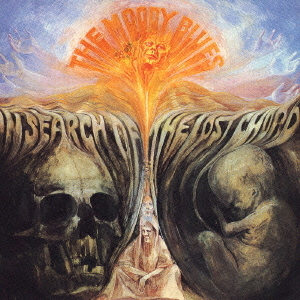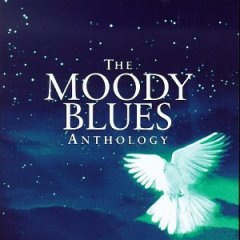
The Moody Blues were an English rock band formed in Birmingham in May 1964. The band initially consisted of drummer Graeme Edge, guitarist/vocalist Denny Laine, keyboardist/vocalist Mike Pinder, multi-instrumentalist/vocalist Ray Thomas, and bassist/vocalist Clint Warwick. Originally part of the British beat and R&B scene of the early–mid 1960s, the band came to prominence with the UK No. 1 and US Top 10 single "Go Now" in late 1964/early 1965. Laine and Warwick left the band by the end of 1966, being replaced by guitarist/vocalist Justin Hayward and bassist/vocalist John Lodge. They embraced the psychedelic rock movement of the late 1960s, with their second album, 1967's Days of Future Passed, being a fusion of rock with classical music that established the band as pioneers in the development of art rock and progressive rock. It has been described as a "landmark" and "one of the first successful concept albums".

On the Threshold of a Dream is the fourth album by The Moody Blues, released in April 1969 on the Deram label. The album reached the top of the album charts, the group's first No. 1 album in the UK.

In Search of the Lost Chord is the third album by The Moody Blues, released in July 1968 on the Deram label.

To Our Children's Children's Children is the fifth album by the Moody Blues, released in November 1969.

Raymond Thomas was an English musician, singer and songwriter. He was best known as a founding member of the English progressive rock band the Moody Blues. His flute solo on the band's 1967 hit single "Nights in White Satin" is regarded as one of progressive rock's defining moments. In 2018, he was posthumously inducted into the Rock and Roll Hall of Fame as a member of the Moody Blues.

Graeme Charles Edge was an English musician, songwriter and poet, best known as the co-founder and drummer of the English band the Moody Blues. In addition to his work with the Moody Blues, Edge worked as the bandleader of his own outfit, the Graeme Edge Band. He contributed his talents to a variety of other projects throughout his career. In 2018, Edge was inducted into the Rock and Roll Hall of Fame as a member of the Moody Blues.

"Voices in the Sky" is a hit 1968 single by the progressive rock band the Moody Blues, and it was written by their lead guitarist Justin Hayward. It was released as a single in June 1968, with "Dr. Livingstone, I Presume" on the B-side. It was later released on their 1968 album In Search of the Lost Chord, and was the first of two singles from that album, the other being "Ride My See-Saw".
"Legend of a Mind" is a song by the British progressive rock band the Moody Blues, and was written by the band's flautist Ray Thomas, who provides the lead vocals. "Legend of a Mind" was recorded in January 1968 and was first released on the Moody Blues' album In Search of the Lost Chord. Prominently featuring the Mellotron, it was the first song recorded for the album.

Anthology is a compilation album by the progressive rock band the Moody Blues. It was released in the US on 20 October 1998. It was not released in the UK until 2001 under the title The Collection with different artwork but with the same tracks as the US release.

"Steppin' in a Slide Zone" is a 1978 single by the English progressive rock band the Moody Blues. It was the first single the Moody Blues had released in five years, after the band's temporary hiatus. It was written by bassist John Lodge, and was released a month later on the album Octave. The song peaked at number 39 on the US Billboard Hot 100 and number 41 in Canada.

Greatest Hits is a compilation album by the progressive rock band the Moody Blues, released in 1989. The band recorded new versions of "Isn't Life Strange" and "Question" with orchestration by the London Symphony Orchestra. The arrangements were overseen by Anne Dudley, who also produced the recordings with Justin Hayward and John Lodge. In 1990, only a year after its original release, the album was re-released as Legend of a Band: The Story of the Moody Blues with different artwork to coincide with the release of the home video documentary of the same name.
"Dr. Livingstone, I Presume" is a 1968 song by the English rock band the Moody Blues. It was written by the band's flautist Ray Thomas, although he does not play the flute in the song. First released in June 1968 on the B-side of "Voices in the Sky," "Dr. Livingstone, I Presume" is one of Ray Thomas's signature child-themed songs, much like his first composition "Another Morning."
"The Best Way to Travel" is a 1968 song by the progressive rock band the Moody Blues. Written by keyboardist Mike Pinder, it was released on the album In Search of the Lost Chord. A wide stereo panning effect, made by the pan pots on the Decca Studios custom-built four-track recording console used during 1967–68, is noticeable on this track.
"Visions of Paradise" is a 1968 song by the progressive rock band the Moody Blues. First released on their album In Search of the Lost Chord, it was written jointly by band members Justin Hayward and Ray Thomas, and was the first of many collaborations between them. The song is primarily led by Justin Hayward's voice and Ray Thomas's flute, with the lyrics describing the writer's perception of paradise.
"Have You Heard" is a 1969 song by the progressive rock band the Moody Blues. Written by the band's keyboardist Mike Pinder, "Have You Heard" is actually a two-part song, and both parts were recorded and released in 1969 on the Moody Blues Album On the Threshold of a Dream.
"Gypsy (Of a Strange and Distant Time)" is a 1969 song by the progressive rock band the Moody Blues, from their album To Our Children's Children's Children, a concept album about space travel. The song was written by band-member Justin Hayward.
"Beyond" is a three-minute long instrumental song by the band the Moody Blues from their 1969 album To Our Children's Children's Children, a concept album about space travel. "Beyond" was written by the Moody Blues' drummer Graeme Edge. It was the Moody Blues' second fully instrumental song on one of their albums. The first was the song "The Voyage" from their previous album On the Threshold of a Dream. It was also the first released Moody Blues song written by Edge that did not involve spoken vocals.
"Procession" is a 1971 song by the Moody Blues and is the opening track of their album Every Good Boy Deserves Favour. It is the only song to have been co-written by all five members of the band.

Live at the Isle of Wight Festival 1970 is a live album by the Moody Blues that consists of their live performance at the Isle of Wight Festival in 1970. The album was released in 2008.

Michael Thomas Pinder is an English musician. He is a founding member and the original keyboard player of the rock group the Moody Blues. He left the group following the recording of the band's ninth album Octave in 1978. Pinder is especially noted for his technological contribution to music. In 2018, he was inducted into the Rock and Roll Hall of Fame as a member of the Moody Blues. He is the last surviving member of the group's original lineup.











